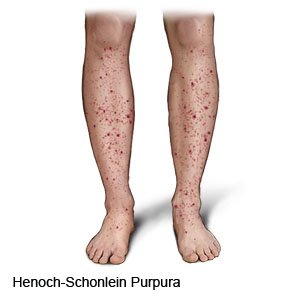Henoch-Schonlein Purpura
Medically reviewed by Drugs.com. Last updated on Aug 4, 2025.
Henoch-Schonlein purpura (HSP) is a condition that causes your immune system to attack and damage your blood vessels. Damage to your blood vessels causes them to swell and bleed. HSP most commonly affects the blood vessels in your skin, joints, intestines, and kidneys. HSP can happen at any age but is most common in children 2 to 11 years of age. There is no treatment for HSP. HSP may eventually get better or become a chronic condition.
 |
DISCHARGE INSTRUCTIONS:
Call 911 or have someone else call for any of the following:
- You have a seizure.
- You have trouble breathing.
Return to the emergency department if:
- You are confused.
- You have a bruise that suddenly gets bigger.
- You feel dizzy or weak.
- Your abdomen looks bigger than usual and is very painful.
- You vomit blood or liquid that looks like coffee grounds.
- You stop urinating or urinate a lot less than usual.
- You have swelling in your face, arms, or legs.
Related medications
Contact your healthcare provider if:
- You have a fever.
- You have blood in your bowel movements or urine.
- You cannot stop vomiting.
- You have questions or concerns about your condition or care.
Medicines:
You may need any of the following:
- Medicine may be given to decrease swelling. You may also be given medicine to stop your immune system from attacking your blood vessels.
- Acetaminophen decreases pain and fever. It is available without a doctor's order. Ask how much to take and how often to take it. Follow directions. Read the labels of all other medicines you are using to see if they also contain acetaminophen, or ask your doctor or pharmacist. Acetaminophen can cause liver damage if not taken correctly.
- NSAIDs , such as ibuprofen, help decrease swelling, pain, and fever. This medicine is available with or without a doctor's order. NSAIDs can cause stomach bleeding or kidney problems in certain people. If you take blood thinner medicine, always ask your healthcare provider if NSAIDs are safe for you. Always read the medicine label and follow directions.
- Take your medicine as directed. Contact your healthcare provider if you think your medicine is not helping or if you have side effects. Tell your provider if you are allergic to any medicine. Keep a list of the medicines, vitamins, and herbs you take. Include the amounts, and when and why you take them. Bring the list or the pill bottles to follow-up visits. Carry your medicine list with you in case of an emergency.
Manage your symptoms:
- Apply ice on your joints for 15 to 20 minutes every hour or as directed. Use an ice pack, or put crushed ice in a plastic bag. Cover it with a towel. Ice helps prevent tissue damage and decreases swelling and pain.
- Apply heat on your joints for 20 to 30 minutes every 2 hours for as many days as directed. Heat helps decrease pain.
- Elevate your joint above the level of your heart as often as you can. This will help decrease swelling and pain. Prop your joint on pillows or blankets to keep it elevated comfortably.
- Drink plenty of liquids as directed. Liquids help prevent dehydration from vomiting or diarrhea. Ask how much liquid to drink each day and which liquids are best for you.
- Rest as directed to help your body heal. Ask your healthcare provider when you can return to your normal activities.
Follow up with your healthcare provider as directed:
You will need to return for blood or urine tests. Write down your questions so you remember to ask them during your visits.
© Copyright Merative 2025 Information is for End User's use only and may not be sold, redistributed or otherwise used for commercial purposes.
The above information is an educational aid only. It is not intended as medical advice for individual conditions or treatments. Talk to your doctor, nurse or pharmacist before following any medical regimen to see if it is safe and effective for you.
Learn more about Henoch-Schonlein Purpura
Treatment options
- Medications for Allergic Purpura
- Medications for Bleeding Disorder
- Medications for Henoch-Schonlein Purpura
Care guides
Further information
Always consult your healthcare provider to ensure the information displayed on this page applies to your personal circumstances.
